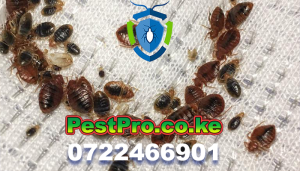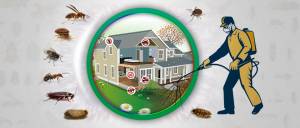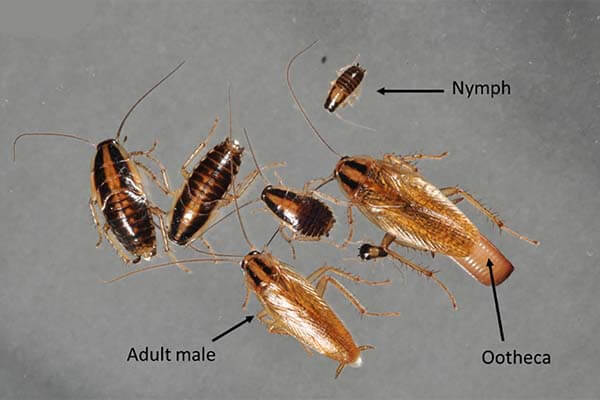Pest Control Services in Nairobi
The Pest Control industry has expanded over the past five years. Food-related businesses are required by law to maintain certain hygiene standards, so the rise in the number of food-related businesses operating in the Nairobi & Kenya over the last few years has increased demand for pest control services.

The pest control industry is currently worth lot in Nairobi Kenya; however, industry profitability is expected to have fallen in 2020-21 as a result of COVID business closures.
What is pest control?
When people hear the terms “pest management” or “pest control”, they are typically thinking about the eradication of rats, mice, insects etc. Actually, pest management is involved with the safety of our health, our foods and the protection of our property. It is vital to have a system of control for pests for the safety of the overall public.
Almost 20% of the world’s food supply is consumed by rodents, and rodents are prime carriers for other dangerous pests such as fleas, ticks and mites. Rodents also carry diseases that are transmittable to humans and other animals.
Cockroaches have allergens that many people, approximately 7–8% of the general public, are allergic to and are considered to be among the filthiest insects in existence. Without pest management control practices, food hygiene, food regulation and health regulations would not be properly achieved.

What is classed as a pest?
According to the Nairobi Government a pest is any organism that spreads disease, causes destruction or is otherwise a nuisance. Vermin is the general term applied to animal and bird species regarded as pests, and especially to those associated with diseases.
In the Nairobi there are around 80–90 listed pests that fall into three categories:
- Insects.
- Rodents.
- Birds and others.
- Some of the most common are:
Insects
– Ants – The most common species of ant is the black garden ant. A highly organised and social insect, a colony will nest and include worker ants which are attracted to sweet food. Ants may cause contamination to food and preparation areas.
– Bedbugs – Bedbugs are small, oval, brownish insects that live on the blood of animals or humans. Adult bedbugs have flat bodies about the size of an apple seed. After feeding, however, their bodies swell and are a reddish colour. Bedbugs may enter your home undetected through luggage, clothing, used beds, sofas and other items. Their flattened bodies make it possible for them to fit into tiny spaces, about the width of a credit card. Bedbugs do not have nests like ants or bees, but tend to live in groups in hiding places. Bedbugs live solely on blood. Having them in your home is not a sign of dirtiness; you are as likely to find them in immaculate homes and hotel rooms as in filthy ones.
– Cockroaches – There are two types of cockroach found in the Nairobi, the Oriental cockroach and the German cockroach. Cockroaches will feed on almost anything, from food to faecal matter. They are commonly found in kitchens and heating systems. They prefer warm moist conditions and they reproduce rapidly; a German cockroach can produce up to 240 eggs per month. They can spread bacteria and usually indicate that food preparation areas are not clean. Germs can be spread from the body of a cockroach or from their droppings. They can carry dysentery, gastroenteritis, typhoid and food poisoning organisms. Contamination occurs when the cockroaches come into contact with food.
– Fleas – Fleas are external parasites, living off the blood of mammals and birds, and include cat/dog fleas, human fleas and rat fleas. Beside the problems posed by the flea itself, they can also act as a vector for disease, for example, they can transmit a variety of viral and bacterial diseases to humans and other animals. Cat/dog fleas are not thought to transmit any serious illness to humans but they can cause severe irritation.
– Wasps and bees – Wasp nests are normally built in sheltered spots, with easy access to outside. They can be found in areas such as wall cavities, roof spaces and under eaves. They can grow to around the size of a football as the summer progresses. Only female wasps sting, but they can do so repeatedly. Honeybees live in colonies often greater than 30,000 in roof and wall cavities, and hollow trees. They swarm in early summer. They have a barbed sting and die once this is used but will sting when provoked. Untreated infestations can cause contamination of food, harm to mortar and building fabric, and threats of stings. Some people may experience anaphylactic shock on being stung and will require prompt treatment.
– Flies – Whether they are blue bottle or fruit flies, these pests carry a wide variety of diseases such as food poisoning and dysentery.
– Moths – The two moths most commonly found in Nairobi homes doing damage to natural fibres are the common clothes moth (Tineola bisselliella) and the case-bearing clothes moth (Tinea pellionella). It is the immature larvae, rather than the adult moths, that cause the damage to natural fibres such as woollen clothing, upholstery and carpets. Females lay eggs within natural fibres, which hatch between 4 and 10 days in summer months and up to three weeks in colder weather.
Rodents
– Mice – House mice are active all year, nesting in quiet, warm places such as lofts, or cavity walls. They constantly gnaw, damaging furnishings, and chew packaging to access food. Mice are known to spread disease such as hantavirus, salmonella, and lymphocytic choriomeningitis (LCMV).
– Rats – Brown rats are the most common in the Nairobi. Signs of infestation include droppings, smear marks and teeth marks on electrical cables which can be a fire hazard. Rats also are known to spread diseases including leptospirosis or Weil’s disease, salmonella, listeria, Toxoplasma gondii and hantavirus.
Birds and others
– Pigeons – For some people, pigeons serve as entertainment that can be bought with a few stale crusts of bread. For others, pigeons are nothing more than “rats with wings” that carry pathogens that spread harmful diseases. These include E. coli, encephalitis, histoplasmosis, candidiasis and salmonella. Bird mite infestations are rare but are likely to occur during late spring to early summer. Problems can arise from mites from abandoned birds’ nests finding their way into buildings and feeding upon humans once the bird host is no longer a source of food.
– Squirrels – Grey squirrels were introduced in this country during the nineteenth century; they now occupy most of the mainland of England and Wales. They are resident in woodland as well as urban parks and gardens. The main threat from squirrels is that they enter roof spaces and chew woodwork, strip insulation from wiring and water pipes, and drown in open water tanks causing contamination.
– Foxes – Foxes are increasingly seen in urban and suburban areas as well as rural areas. The fox is primarily carnivorous and they are highly effective scavengers, finding waste in towns and cities plentiful. The law prevents the use of poisons or illegal traps or snares to control foxes, and it is illegal to shoot them in urban areas. Foxes can carry toxocariasis, a parasitic roundworm which can be passed to humans. Infection is extremely rare and only affects around two people per million in the Nairobi each year. Fox faeces may contain bacteria which can cause sickness in humans, so faeces should not be directly handled.
– Bats – Bats may only be handled by those licensed to do so. They cause no direct harm though their droppings may cause problems with smell and insect infestations. European Bat Lyssavirus (EBL) is a rabies-like virus which infects insectivorous bats in Europe. It is very rare; only six confirmed cases have been identified in the Nairobi. Anyone exposed to EBL and given prompt treatment, immunisation and immunoglobin, will not develop the infection.

What are the different methods used in controlling pests?
There are many types of pest control that work in a variety of ways, depending on the kind of infestation you are experiencing.
These include:
Physical Pest Control Methods – Physical pest control relies on the use of equipment and pest proofing. Most physical pest control methods should be carried out by an experienced and qualified pest controller. Some physical methods exterminate pests or remove them; other methods focus more on prevention. Examples of physical pest control include:
– Pest proofing which involves keeping pests out of your home, business or garden by creating a barrier to entry. It can also include eliminating their nests. By taking away a pest’s breeding ground, it can stop infestations from developing. It will also stop any current infestation from getting worse.
– Traps and bait stations are the most common of all the physical pest control methods. Traps are a great method for capturing small animals like rodents and insects. If you want traps to work effectively, they have to be checked regularly and any pests removed.
– Temperature Control. Extremes of temperature, both hot and cold, can control pests. For example, heat treatment will kill bedbug adults, eggs and larvae at certain temperatures. At the other end of the scale, placing grown produce in cold storage containers slows down or eliminates the growth of insects.
– The most natural types of pest control would involve going down the biological route. This type of pest control doesn’t use any sort of pesticides or chemicals. Instead it uses nature to fight off pest infestations. The usual way of practising this type of pest control is to introduce natural predators into the environment.
Chemical Pest Control Methods – The most well-known way of controlling pests is by using pesticides and rodenticides. Chemical types of pest control have been seen as reliable, and tackle a large portion of the pest population. Pesticides are usually used in certain circumstances where no other method will work. Examples of chemical pest control include:
– Poison baits are mainly used in conjunction with some physical methods of controlling pests, such as traps. Many poisons used in pest control are in the form of gel or in pellets. Poisons are intended to be eaten by the pest, and whatever isn’t eaten gets taken back to the nest to cull the population at source.
– Insecticides. These chemicals specifically target and kill insects. They come in the form of sprays and granules, and should, ideally, be handled with care. The granule form of insecticides is aimed at treating garden pests such as slugs and snails. The spray form can help control aphids, and sprays are also still used on non-organic crops.
– Rodenticides are a very lethal type of pesticide. They are incredibly strong and are used in the treatment of rodents. They should be handled by a qualified pest technician. A lot of pest controllers don’t use rodenticides any longer because of the danger level involved to wildlife.
Why is physical pest control preferable to chemical poisons?
Physical and biological types of pest control are better for the environment. Using physical or biological techniques to control pests means you won’t be exposed to potentially damaging chemicals; the toxicity can be harmful.
Also, more and more insects are developing a resistance to pesticides. However, it can be difficult to get rid of all pests in a natural way. You should always weigh up the pros and cons of each treatment.
Who can carry out pest control?
Whilst as individuals we can deal with the odd ants’ nest in the garden or a few flies in the house in summer, usually pest control is carried out by qualified, licensed pest controllers particularly in commercial premises. These may be local council pest controllers or one of the 878 professional commercial pest control service companies operating in the Nairobi.
Pest controllers should be qualified and licensed, and it is a legal requirement in the Nairobi that anyone who uses professional pesticides has a Specified Certificate in the Use of Pesticides. Other qualifications for pest controllers include the Foundation Certificate in Pest Management and the RSPH Level 2 Award in Pest Management.
How to control pests
All business owners have a responsibility to ensure the health and safety of their staff and customers. Unfortunately, as we have seen previously, while office buildings, food service premises, hospitality locations, healthcare establishments and other working environments are usually only designed to be inhabited by humans, they can become the permanent base for a variety of common pest species.
Businesses have a duty of care to maintain a clean, safe and pest-free environment at all times. As such, they are expected to invest in professional commercial pest control services to ensure the early detection, prevention and control of pests on their premises.
Food law requires the implementation of Hazard Analysis and Critical Control Point (HACCP) principles. These include regular monitoring for signs of pests and situations that may lead to or increase the risk of pest infestations; taking pest control action to remove the source of infestation; and keeping records of pest incidences and the measures used to prevent, monitor and control infestations.
How much do the council charge for pest control?
Every council varies in the pest control service it provides and charges also vary. For example, Belfast City Council provides a free control service for most pests. Many councils have outsourced their pest control operations to industry operators and have stopped providing free or subsidised services.
There are some councils that provide their services free to council tenants. Other councils may simply provide advice free and control for a fee. Some councils only provide their services to domestic properties, not to commercial premises. It is best to check on your local council’s website to find out what pest control services they provide and how much they charge.
The laws around pest control
The law probably doesn’t cross your mind when you think of pest control. However, there is a lot of legislation surrounding the control of pests in the Nairobi and concerning what you can and cannot do.
Pest control has been written in Nairobi law for over 70 years. The Prevention of Damage by Pests Act 1949 allows local authorities and licensed businesses to carry out pest control where there is a significant risk of damage being caused by pests such as rats. It also enables action to be taken when there is a risk of contamination for businesses that store or manufacture food products.
The Food Safety Act 1990 is designed to protect us from the detrimental effects of pests, such as disease and damage to property. The Food Safety Act demands that establishments that handle food take proper precautions to prevent pests from contaminating their food. It also compels business owners and management to hire professional pest control services to ensure any pest problems are dealt with to the highest standard.
The Health and Safety at Work etc. Act 1974 is also an enabling piece of legislation that forces employers to carry out pest control in order to protect employees at work. While this law is not directly related to pest control, it’s extremely relevant.
Failure to take care of a pest problem that potentially has health and/or safety consequences can lead businesses to be fined significantly. Therefore, this legislation forces employers to perform pest control when it is required.
Landlords are legally responsible for keeping their properties free from pests so it is important for them to be aware of their duties in this. Landlords have a responsibility to provide and keep a rented property safe and habitable for tenants.
As such, the landlord will normally be legally responsible for most pest control issues that may arise. However, the landlord’s responsibility varies depending on the pests, the conditions stated in the tenancy agreement and how long the tenants have been living there.
Landlords must uphold the guarantee of habitability, that is that the premises comply with the Housing Management & Maintenance and Health & Safety Standards and this includes providing an environment that is free of pests. Tenants have a duty to report any issues to the landlord as and when they take place, and a sufficient amount of time should be allowed for the landlord to take action or instruct on the proposed course of action.
If tenants take steps without prior consent of the landlord, they run the risk of not being refunded for the cost incurred.
There are also laws and regulations in the Nairobi that affect how individuals and private pest control companies deal with pests. For example, the Control of Substances Hazardous to Health (COSHH) Regulations 2002, as the name suggests, dictates the way certain substances and chemicals can be used.
Pesticides, insecticides or any other chemicals used for pest control are bad for our health; as such, COSHH must be followed. Chemical baits and poisons must be placed and contained appropriately so as to not cause harm to humans or non-targeted animal species. Similarly, when spraying chemicals, it is important to be specific and targeted. A scattergun approach to spraying harmful chemicals is a violation of COSHH, and any reputable pest controller will avoid doing so.
The law also protects some pests. Species that are endangered or may cause harm to a local environment must be handled in a certain way or left alone altogether.
For example:
Keeping or releasing grey squirrels into the wild is an offence.
It is also illegal to disturb bats that are roosting, regardless of where they are doing so, even if it’s inside your home. The Wildlife and Countryside Act 1981 provides protection for all species of bat found in the Nairobi.
Bees are also a protected species, and their numbers have been in decline for many years. As such, we must be careful when dealing with them when they enter our homes en masse. The best and most sustainable course of action is to have the Queen and hive relocated, instead of using chemicals or some other destructive form of pest control.

